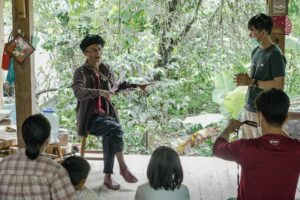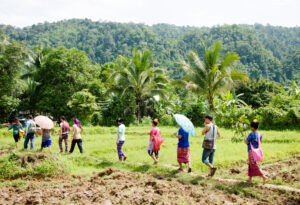Training and Capacity Development Project
The Training and Capacity Development Project was first implemented in 2005 and has continued to operate to the present day. It became an official program of the foundation after its registration in 2010.
The 2025 program plan outlines the training operations as follows:
First training period: May – July 2025
Second training period: September – November 2025
The training activities for 2025 are organized into three key phases:
Phase 1: January – April 2025: Application and Participant Selection
During this initial phase, applications for the program are open. Once the required number of applications is received, program coordinators and international volunteers conduct field visits to interview and select participants. The goal is to recruit two participants each from Thailand, Laos, Cambodia, and Vietnam (currently in the planning stage), and eight participants from Myanmar—resulting in a total of 16 to 18 participants, in alignment with the program’s budget.
Phase 2: May – July 2025 : Online Learning and Exchange
This phase includes online classroom sessions designed to foster cross-border learning and exchange. The curriculum is divided into thematic training modules tailored to participants. Topics include, but are not limited to: Cross-cultural communication, International environmental law, The operational mechanisms of international financial institutions etc.
Phase 3: September – November 2025: On-site Training in Chiang Mai
This in-person phase is held in Chiang Mai Province. The program invites knowledgeable speakers and experienced practitioners from both Thailand and abroad to conduct training on a wide range of topics. During this time, participants also undertake field study visits across various regions in Thailand, which alternate with classroom-based sessions. For instance, visiting the Mekong River Basin in Chiang Khong District, Chiang Rai Province, exchanging knowledge about coastal climate change impacts along Thailand’s Eastern Seaboard etc. These study visits serve as case studies for the participants, enabling direct learning from local communities. Activities focus on community-based organization, local empowerment, and establishing community organizations and building community networks.
Short-Term Action Research Component
Each participant designs and conducts a short-term action research project based on issues of personal or professional interest. These projects are grounded in the participant’s home country and involve case studies on development, environmental challenges, and community livelihoods. During the research phase, project staff visit each country to offer guidance, exchange ideas, and provide tailored feedback. Returning to their home contexts, participants apply insights gained in Thailand to analyze, compare, and reflect on their local challenges. Special attention is paid to the unique political, social, cultural, and ecological conditions of each country—enhancing participants’ critical understanding of their national contexts and preparing them to engage more effectively with global
Final Phase :Presentation and Knowledge Exchange
In the final stage of the program, participants present the results of their action research and engage in collective reflection on the research process. Given the diverse political, cultural, social, and ecological conditions of their respective countries, participants must approach research with sensitivity and adaptability. These differences require a variety of methodologies and strategies, making the research process both challenging and enriching. This final phase fosters a new dimension of learning as participants share experiences and outcomes across borders.
Project Objectives
- To enhance leadership, teamwork, and organizational development skills, particularly in the context of non-governmental organizations (NGOs)
- To build participants’ ability in international environmental law, including critical evaluation of its application and implications at the community level through localized research
- To develop skills in project proposal writing and in identifying and securing international funding sources for community and organizational development
- To improve participants’ English language proficiency throughout the training program










